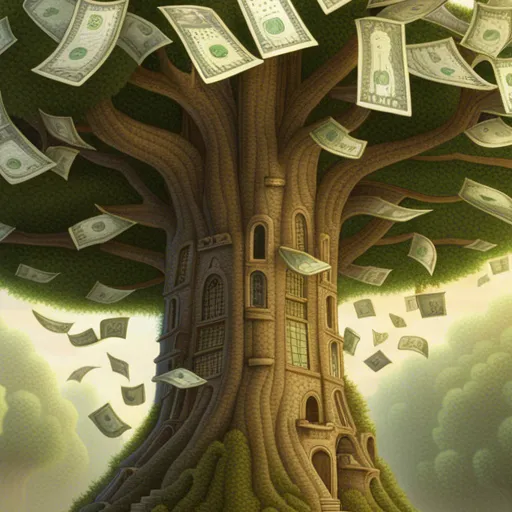10 things I learned from The Deficit Myth: Modern Monetary Theory and the Birth of the People's Economy by Stephanie Kelton
I thought that modern monetary theory ( MMT) sounded more like a magical money tree, but this book did turn my thinking on its head.
The main premise is that if you have a powerful government that can print an unlimited amount of its own currency (fiat currency), the "household budget" rules that individuals and businesses need to follow do not apply.
By branding itself, as a "modern" theory, it implies that other ideas about governments living within their means are outdated and old-fashioned. I can't decide whether this is correct or insane. By the end of the book I was convinced that this is certainly how the US currently works and it seems like it might be sustainable.
I also read from somebody else that whether you agree with this idea or not, it is how the US government is currently being run so you might as well understand it. After all, we always seem to have enough money for war, and we never have to ask to finance it.
According to the author, very few politicians understand how the US government spending works. Politicians, especially many with business backgrounds, try to run the government like a business or household and that makes sense to most voters. According to MMT that is backwards.

1. Stephanie Kelton has a Phd in Economics, is a professor at Stony Brook University and was designated Chief Economist for the Democratic Minority Staff of the Senate Budget Committee in 2014
She also worked for Bernie Sanders and has had a chance to influence people high in government.
https://en.wikipedia.org/wiki/Stephanie_Kelton
So she isn't just a YouTube crank but a sophisticated and influential voice for MMT.
2. MMT: Spend First, tax later to redistribute money and cool inflation.
Taxes don’t directly fund government spending. In reality, the government spends money first and then collects taxes. This redefines the conventional way of thinking about taxation and government expenditure.
Ms. Kelton points out that if the money (dollars) were not distributed first there would not be any to pay the tax with.
3. What is "the people's economy?"
It's not the taxpayers who fund the government, but the government that funds the taxpayers. This fundamental shift in perspective has implications for how we view taxes, spending, and public services.
The economy isn't just numbers and money; it's a tool to fulfill the desires and needs of citizens and the broader society. This human-centered approach can guide better economic policies.
4. National Debt Misunderstanding: Debt and Deficits are not inherently bad
Modern monetary policy (MMT) views the national debt not as a debt but as a savings clock—essentially money that has not been recollected by tax. Deficits inject money into the economy, while the common perception of national debt is upside down.
Beyond financial shortfalls, real societal deficits lie in areas like healthcare, good jobs, education, and other public needs. Addressing these is as crucial, if not more so, than financial balancing acts.
5. Inflation and Deficit:
Inflation is an indicator of the deficit's size. High unemployment implies a too-small deficit, while high inflation suggests a too-large deficit.
6. Currency Sovereignty: currency on demand
Countries like the United States that have left the gold standard (or have sovereign currencies not pegged to a standard) have the flexibility and power to create currency on demand. This is contrasted with countries tied to another currency or standard, which face economic limitations.
This is the direct opposite of people that don't like the idea of having left the gold standard in 1971.
7. Job Guarantee Proposal
This is a more radical idea. A federal job guarantee would act as a buffer for the job market, allowing people to switch between the public and private sectors based on economic conditions. This would inherently change the dynamics of unemployment and recession periods.
Basically by having the government create a supply of jobs at a certain pay rate, doing things like repairing infrastructure and caring for the elderly, you could guarantee full employment and put more dollars into circulation and also get useful things accomplished.
This way when the private economy slows these jobs can take up the slack and when the private sector heats up people can transition from these government jobs into full employment.
8. Social Security, and by extension other federally funded programs, will never run out of money as long as deficit spending is an option
While frequently debated, the trust funds set for these programs are not the ultimate deciders of the programs' viability.
Social Security is a massive political football. There are some unnecessary rules about it being funded by trust funds. The author points out that the government can simply print as much currency as it needs to meet its obligations.
9. Taxes have other uses besides revenue collection
Taxes have various roles, including driving people's desire to work, controlling money balance to prevent inflation, redistributing income, and discouraging certain behaviors (like sin taxes). MMT emphasizes the purpose of taxes beyond mere revenue collection.
10. What happened to Greece or Argentina?
Countries dependent on foreign currencies (like the US dollar) are at a disadvantage as they can't control their currency. Nations with the ability to create their own currency, like the US, can leverage MMT principles to their advantage, whereas others, like Greece or Argentina in past scenarios, faced economic collapses due to currency restrictions.
Greece was tied to the Euro so when its economy had problems it could not print its way out of it. Argentina had to default on debt that it owed in US dollars: it did not have the power to print dollars and nobody wanted the pesos.

No comments.